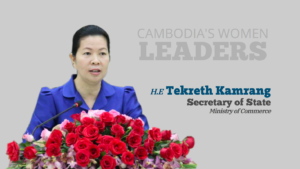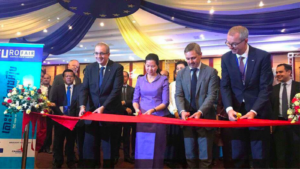
This is a single part of a series of stories of 21 women leaders of Cambodia. Download the full publication here.
Give a short introduction about your life (family, education, marital status) and how has your experience been as a leader and what achievements are you most proud of?
I am married with 3 children. They are 14, 11 and 8 years of age. My husband is a doctor and a Health Administrator working in the private sector. In terms of education, I graduated from the University of Health Science in Phnom Penh in 1996. With the support from the US Fulbright Scholarship Program, I further pursued my studies at the University of Oklahoma School of Public Health in the United States and earned my Master’s of Public Health in 2004.
Before that I also completed a one-year training program in Australia in 2000, with a Diploma in Human Resource Management. In addition, I’ve participated in many short course training programs in Leadership and Management, International Trade, Economics, and Finance among others. My most recent formal training was on Public Administration at the Royal School of Administration, Cambodia, in 2016.
Overall, I would say that all of my education and training programs have been very valuable to me, to allow me to excel in my career. I am very proud, that as a woman, I’ve been given opportunities to learn and apply my knowledge and skills to serve my country and contribute the best I can to the development of the nation.
Women need to equip themselves with knowledge and skills, to set goals, and to come forward courageously.
When you first started out with your career, what were your most significant challenges?
My first and most significant challenge was how to turn my knowledge into real workplace practices. How to adapt myself from the ideal world of the school lab environment to the complexity of the day-to-day work environment was a big test for me. Sometimes I felt even finding a straightforward solution to a seemingly simple problem was so hard in the context of uncertainty. I think your first step is always harder than the next one, in the journey of life. Trying to address people’s needs and meeting their expectations are always challenging, but at the same time, they always teach me good lessons and make me more mature in dealing with people in different settings, and working more effectively.
Over the years, what valuable lessons have you learned as a leader?
I think as a leader we need to have a strong will and a strong mind to lead people, to encourage your team to execute any policy or any tasks to achieve the common goal.
The second lesson for me is being fair. This quality in a leader will bring unity and create harmony in the workplace. People will look up to you and follow you as long as you can be trusted to make fair judgments.
Third, leaders need to have a big heart: respectful, caring, and thoughtful. Leaders also have to treat people with dignity, regardless of differences. Having compassion and understanding people’s needs are very important for a leader to gain people’s hearts. Working with people and making time and effort to reach out to them with empathy are the basis for trust and long-lasting relationships and mutual respect.
What are your core values and how do you ensure your team/ staff/ family/ customers is aligned with your values?
I could say being loyal, honest and having perseverance. I believe that being loyal to one’s cause, one’s commitment and one’s obligation are great qualities. Being honest, to me, means to know oneself, to walk the talk, to be sincere about one’s actions or reactions to all stimuli around us. One more important thing, to achieve anything in life we need to persevere in whatever we do personally or professionally. Without strong commitment, discipline and hard work I do not think we could succeed in life.
To get people to align with our values is not an easy task, given that people have different backgrounds, views, and expectations. However, through constant communication people can learn something from you when they see you as their role model and see you being productive. That’s the reason for us, as a leader, to lead by example; walk the talk, and only then can you earn people’s respect and trust and help them to follow or align themselves with your shared values.
What are some of the behaviors or traits that you think are negatively impacting leadership?
I believe that selfishness, lack of self-confidence and lack of courage are probably not helpful for any leader. I feel people would not like to follow a leader who always thinks about him/herself, who does not care about others, who is not clear about his or her vision or direction, and who does not have the courage to confront reality and accept responsibility.
What are you doing to continue to excel as a leader (leadership tips in doing business and promoting women’s economic empowerment or gender equality)?
For me leadership is like an art, and skills, which can be learned, applied, improved and mastered over time. It is an ongoing learning process, which never ends. If we stand still, we’ll surely not just lose what we’ve already gained, but we’ll become out of date and obsolete in our fast-changing world! Therefore, constant learning and growing is important to ensure we are more productive, effective and efficient in every endeavor. I consider every setting a learning opportunity for me to advance and excel personally and professionally.
Thanks to the RGC, under the leadership of Samdech Prime Minister, women have been given the opportunity to participate in every level of socio-economic development in the public and the private sector. Many women have taken leadership positions in the government. I treasure this role and responsibility and use all my abilities to serve my country and my people.
For instance, as Cambodia is an export led country, I think promoting trade and the diversity of our markets and product base is one of the most important components needed to maintain economic growth. We need to work together to make it happen. In addition, since women play an important role in economic development, we have to continue to encourage other women to actively participate in national development. We need to help them to build entrepreneurship and to strengthen their economic power through integrating gender equality and women’s empowerment into national policy formulation and implementation. To support women, we need to understand the barriers for women’s economic growth, by listening to what they need for support, by networking more with women groups, women entrepreneurs and by trying our best, in our capacity as women in a leadership role, to bring about more changes to women’s lives.
What are some of the biggest risks you’ve taken in your career and how did they turn out?
I think you have to take risks to change from one job to another or to move from one job to another. I always had mixed feelings and needed a lot of courage. It also happened when I took time off from my work to further my higher education overseas. I could say that it was a big challenge for me. I risked coming back and losing my post or facing uncertainty. Fortunately, it turned out well for me. I have learned that risk taking makes me wiser, stronger, and able to work more effectively.
Now, I’ve become more and more confident in what I’m doing in my job and I feel very thankful to the Leadership of RGC and to the Ministry of Commerce, who have shown trust in me and have given me new assignments and the opportunity to serve to my full potential.
What makes Cambodian culture unique and how do you think Cambodia can thrive in this age of entrepreneurship & dynamic leadership.
I think Cambodian culture is welcoming, open, friendly, accepting and supportive of innovations, development and growth. In addition, Cambodia has now become an island of peace and a famous tourist destination. Under the leadership of Samdech Prime Minister, Cambodia has maintained its economic growth at around 7% over the last 20 years. In addition, the RGC considers the private sector an engine of growth and has put in place several strategies to support the private sector.
Those favorable conditions will allow entrepreneurship to prosper. New ideas or innovations could be tested, new products developed and adopted, new networks of distribution established; and eventually when the models are proven to work in the marketplace, expansion and growth will follow.
However, in order for all of that to happen, there is no doubt that the public and private sectors should work together, hand in hand. And businesses need to understand the market demands both domestically and internationally, and to have the ability to mobilize resources in order to respond to the market in the right way. That said, entrepreneurs and business leaders should have a clear vision, direction and strategies in place to guide their day-to-day activities towards success.
What advice do you have for young Cambodian female entrepreneurs?
In my opinion, Cambodian women are privileged to be in a culture which treasures women. Not like in the old days when not many women were encouraged to study and work away from their home. Women now have more freedom and more access to good education, professional employment and to our own world of creation. There are more opportunities for women in the younger generations to learn, excel and prosper than ever before. I think what young women or young female entrepreneurs need to do is to equip themselves with knowledge and skills, set their goals, and come forward and act courageously! We have to break the negative old-fashioned norms, which prevent us from being active and creative in social and economic development. We need to empower ourselves to be leaders! We’re innovative, we’re creative and we’re strong and capable of doing things and pursuing our own dreams. Let’s just do it and keep going until we succeed!
© Copyright 2019
This is a joint publication by Woomentum and Konrad Adenauer Stiftung. Download the full publication here.

